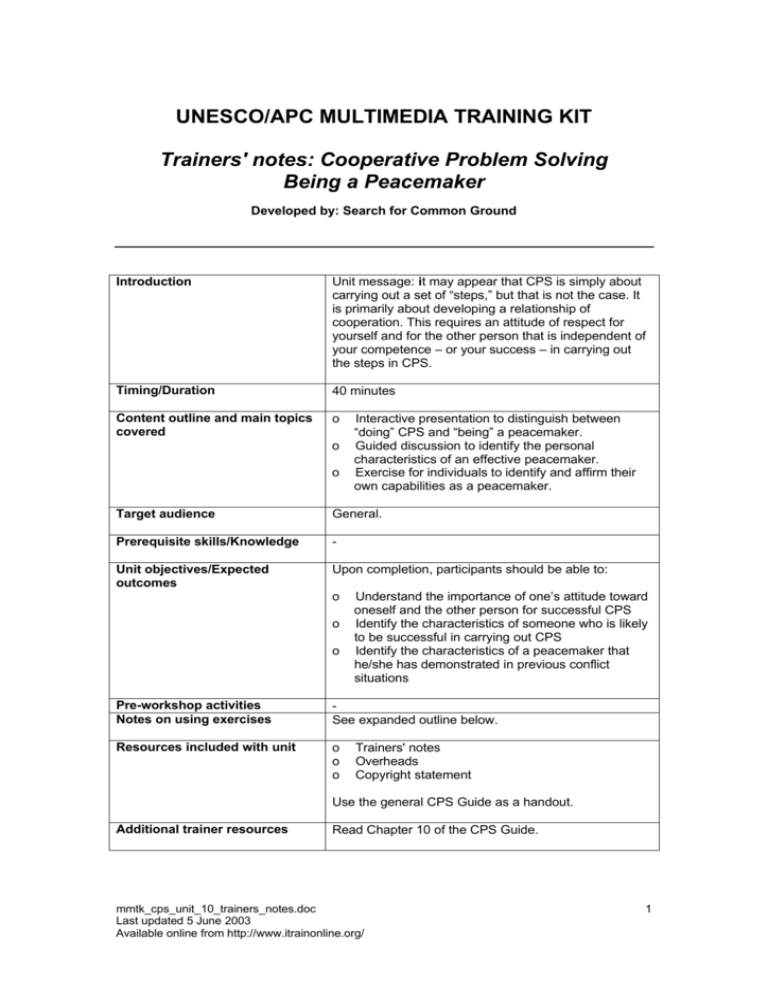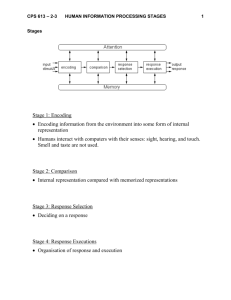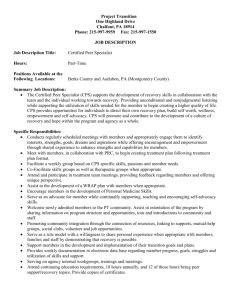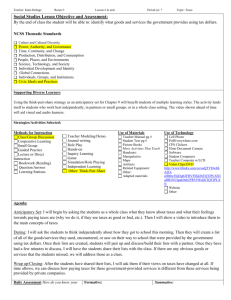Trainers' notes
advertisement

UNESCO/APC MULTIMEDIA TRAINING KIT Trainers' notes: Cooperative Problem Solving Being a Peacemaker Developed by: Search for Common Ground Introduction Unit message: it may appear that CPS is simply about carrying out a set of “steps,” but that is not the case. It is primarily about developing a relationship of cooperation. This requires an attitude of respect for yourself and for the other person that is independent of your competence – or your success – in carrying out the steps in CPS. Timing/Duration 40 minutes Content outline and main topics covered o o o Interactive presentation to distinguish between “doing” CPS and “being” a peacemaker. Guided discussion to identify the personal characteristics of an effective peacemaker. Exercise for individuals to identify and affirm their own capabilities as a peacemaker. Target audience General. Prerequisite skills/Knowledge - Unit objectives/Expected outcomes Upon completion, participants should be able to: o o o Understand the importance of one’s attitude toward oneself and the other person for successful CPS Identify the characteristics of someone who is likely to be successful in carrying out CPS Identify the characteristics of a peacemaker that he/she has demonstrated in previous conflict situations Pre-workshop activities Notes on using exercises See expanded outline below. Resources included with unit o o o Trainers' notes Overheads Copyright statement Use the general CPS Guide as a handout. Additional trainer resources Read Chapter 10 of the CPS Guide. mmtk_cps_unit_10_trainers_notes.doc Last updated 5 June 2003 Available online from http://www.itrainonline.org/ 1 Equipment needed o o o o o Comments Expanded outline Blackboard/whiteboard and chalk/dry erase markers or flipchart, markers, and tape Pencils and paper Arrange for breakout rooms, if possible “Definitions” poster (made from overhead included with this unit) “Map” poster (made from overhead included with this unit) Before conducting this unit, draw Figures A and B (CPS Guide p. 25) on the flipchart or board. 1. Introduction (5 minutes): CPS is not simply about carrying out a set of "steps"; it is primarily about developing a relationship of cooperation. This requires an attitude of respect for yourself and for the other person that is independent of your competence - or your success - in carrying out the steps in CPS. We refer to this as "being a peacemaker". 2. Interactive Discussion (15 minutes): o (Refer to CPS Guide p. 25; overheads included with this unit) o Being a peacemaker (Figure A): When we are (1) being a peacemaker (a matter of attitude, conviction, and presence, independent of circumstances), we (2) do things that make it more likely to (3) have a good agreement and a good relationship. o This is different from the way we often think about how to be successful (Figure B): That if we just (1) do things right, we will (2) have what we want, and we will then (3) be satisfied. 3. Guided Discussion (10 minutes): Begin a guided discussion by asking a question such as: "Think of someone that you know who has been effective in helping people to resolve conflicts. What are they like? What are some of their characteristics?" Refer the participants to "Characteristics of a Peacemaker" - CPS Guide p. 25; overhead include with this unit. 4. Mini-Exercise (10 minutes): o Individuals write: Think of a time or an incident in which you demonstrated some characteristics of a peacemaker (one that you wouldn't mind discussing with someone else). Write a description of the incident, what you did, and some adjectives that describe your attitude and how you behaved in that situation. mmtk_cps_unit_10_trainers_notes.doc Last updated 5 June 2003 Available online from http://www.itrainonline.org/ 2 o Pairs share: Please pair up with someone and describe the incident to your partner. Describe what you did and the peacemaking characteristics you demonstrated. No discussion is permitted; the partner just listens. o Conclusion: I hope that this has helped you recognize the part of yourself that will help you be successful in doing CPS - that part of you that is a peacemaker. 5. Closing Thoughts: I would like to refer you to three pages in your CPS Guide that deal with being a peacemaker: o o o Mandela/Williamson (CPS Guide p. 26) "Our Better Angels" (CPS Guide p. 26) "Attitude" (CPS Guide p. 27) 6. Evaluation: If you are presenting this unit separately (not as part of the whole Cooperative Problem Solving workshop), please refer to Unit 14, "Workshop Evaluation," for guidance on how to conduct an evaluation of an individual unit. 7. Conclusion: o Review the major points covered in this unit. o If the entire module is being taught, introduce the next unit, "Understanding BATNA". mmtk_cps_unit_10_trainers_notes.doc Last updated 5 June 2003 Available online from http://www.itrainonline.org/ 3





